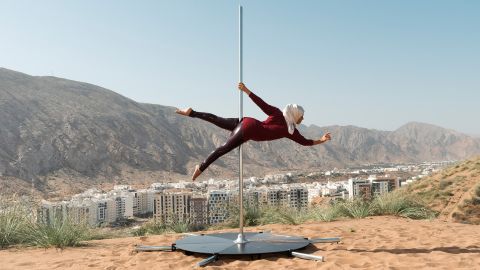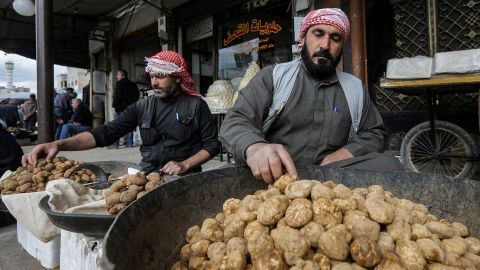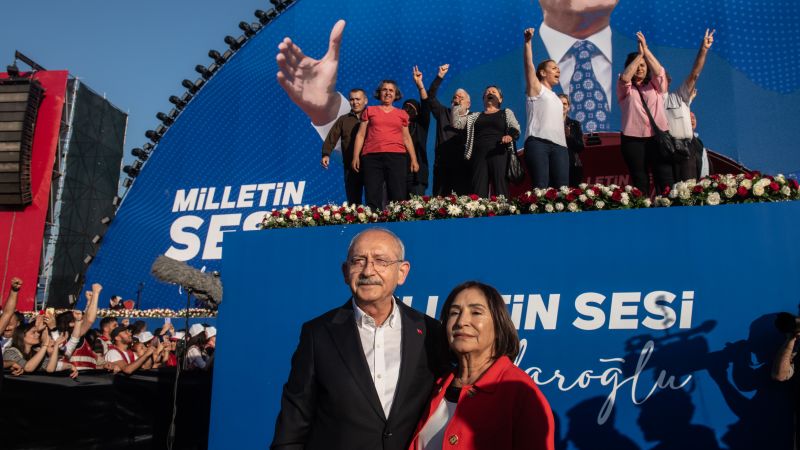Erdogan’s ‘polar opposite’ wants to replace him as president of Turkey | CNN
Editor’s Note: A version of this story first appeared in CNN’s Meanwhile in the Middle East newsletter, a three-times-a-week look inside the region’s biggest stories. Sign up here.
Abu Dhabi, UAE
CNN
—
Turkey’s opposition on Monday announced Kemal Kilicdaroglu as the presidential candidate to run against two-decade ruler Recep Tayyip Erdogan in an upcoming election that could change the course of the country.
Leader of Turkey’s secular and center-left Republican People’s Party (CHP), Kilicdaroglu (pronounced Ke-lich-dar-ou-loo) is widely seen as everything Erdogan is not. He was finally nominated after three days of political bickering among the six-party alliance – just three months before the vote.
His much-awaited selection also came after strong criticism of the opposition bloc for their delay in choosing their frontrunner, which analysts said may have bolstered Erdogan’s chances.
Perhaps the most important election in Turkey’s modern history, the vote is expected to take place on May 14.
It comes just months after a deadly February 6 earthquake rocked the country’s southeast, killing more than 50,000 people in Turkey and Syria. It also falls amid soaring inflation and a currency crisis that last year saw nearly 30% slashed off the lira’s value against the dollar.
Erdogan, who turned 69 last month, is hoping to extend his power well into a third decade. And while the AK Party leader is today facing the fiercest opposition yet to his rule, polls suggest a very tight race between him and the CHP candidate even after last month’s earthquake caused widespread disgruntlement in his strongholds.
But who is the slightly older, bespectacled contender hoping to break Erdogan’s 20-year grip on power?
A lawmaker representing the CHP since 2002 – the same year that saw Erdogan’s AK Party rise to power – Kilicdaroglu, 74, climbed up the political ladder to become his party’s seventh chairman in 2010.
Born in the eastern, Kurdish-majority province of Tunceli, the party leader ran in Turkey’s 2011 general election but lost, coming second to Erdogan and his AK Party.
Kilicdaroglu represents the party formed 100 years ago by Mustafa Kemal Ataturk, the founding father of modern Turkey and a die-hard secularist. He stands in stark contrast to Erdogan’s Islamist-rooted party and its conservative base.
Despite his secular leanings, however, the opposition candidate and his alliance have vowed to represent all factions of Turkish society, which analysts say was demonstrated in his diverse coalition.
The opposition bloc’s roadmap has been clear in its aim to reverse Erdogan’s presidential system, moving towards a more inclusive parliamentary system where the president’s role holds less power.
“There will no longer be a centralization of power at the hands of the president,” said Mehmet Karli, coordinator of the Program on Contemporary Turkey at the European Studies Centre at Oxford University.
“The presidency will become a symbolic office and Turkey will revert back to the parliamentary democracy that it was since 1921,” Karli, who is also a long-term adviser to Kilicdaroglu, told CNN.
Kilicdaroglu stands for a more “pluralist Turkish identity,” said Karli, where freedoms and liberties are cherished.
Sometimes referred to as “Ghandhi Kemal” for both his physical resemblance to India’s Mahatma Ghandhi as well as his humble decorum, Kilicdaroglu is seen as Erdogan’s polar opposite, analysts say.
“Kemal Kilicdaroglu is everything President Recep Tayyip Erdogan is not,” Gonul Tol, founding director of the Middle East Institute’s Turkey program in Washington, DC, told CNN’s Becky Anderson on Tuesday. “Erdogan is a rightwing, populist firebrand who has dismantled the country’s institutions to establish his one-man rule.”
“He has little regard for expertise or liberal democratic values,” she said, adding that while Kilicdaroglu is not as charismatic, “he wants to rebuild the country’s institutions, diffuse power and rule with consultations and compromise.”
While both Kilicdaroglu and Erdogan hail from humble socio-economic backgrounds, “they evolved to be completely different creatures,” says Murat Somer, a political science professor at Koc University in Istanbul.
Symbolically, “Erdogan is the shopkeeper, Kilicdaroglu is the bureaucrat,” said Somer, referring to Erdogan’s businessman-like approach, as opposed to that of Kilicdaroglu, who Somer says is more committed to procedure.
“Kilicdaroglu will try to fight corruption and also bring past corruptions to justice,” he said.
Kilicdaroglu is expected to have a softer and more predictable approach toward the West, analysts say, as he will not be acting unilaterally but through institutions.
“Kilicdaroglu is a strong believer that Turkey belongs in the West,” said Karli, his adviser.
If the West wants a relationship with Turkey that is based on “shared values,” says Somer, then they are very likely to experience a much better partnership under Kilicdaroglu, whose values, he said, are much closer to those of the West and the European Union.
Conflicts with foreign powers are still bound to take place, he continued, as Turkey has its own national interests which Kilicdaroglu and the opposition are also keen to preserve.
“But it will defend these interests with a different discourse and with a different approach,” Somer said, adding that Kilicdaroglu’s foreign policy is likely to rely on Western alliances.
Erdogan’s foreign policy has often been described as “combative” and “personal,” which the opposition may change to become more institutional, predictable and based on soft power, Somer said.
Turkey’s friendship with Russia may also witness change, experts say. A close friend of Erdogan, Russian President Vladimir Putin has been clear to support his Turkish counterpart.
Karli says that Kilicdaroglu will call out Russia for its violation of international law, referring to the Russian invasion of Ukraine, while maintaining a balancing role between Moscow and Turkey’s Western allies.
In the Middle East, where Erdogan has for months been pledging a new incursion into northern Syria amid his fight with Kurdish militants, Kilicdaroglu’s approach is expected to be much less interventionist, experts say.
Kilicdaroglu is a follower of Ataturk’s maxim, says Karli, that “unless a nation’s life faces peril, war is murder.”
This year’s election presents an unprecedented scenario where one candidate, Erdogan, is running against a coalition of parties that haven’t traditionally seen eye-to-eye on ideology, analysts say.
Somer, of Koc University, sees Kilicdaroglu’s approach to running in a coalition as a potential strength.
Kilicdaroglu and the two vice presidents he has named are the three most popular leaders in the country, said Tol. “If they run as a team, this will certainly broaden the appeal of the opposition coalition,” she said.
The next three months will define Turkey’s future. And while many critics expected the earthquake to impact Erdogan’s reelection chances, polls indicate that the government is not likely to lose as many votes as the opposition anticipated, Ozer Sencar, chairman of MetroPOLL, a Turkish polling firm, told CNN.
“After the earthquake, Erdogan’s popularity decreased by only 1 point, while Kilicdaroglu’s popularity decreased by 5 points,” he said.
“All these data show that the losses of the government and Erdogan due to the earthquake are at a level that can be compensated.”
The race is going to be a tight one, said Somer.
“It will be a referendum between democracy and autocracy, not an election between two candidates,” he said. “It will be an epic story.”
Iraq enforces seven-year-old ban on alcohol sale
Iraq has begun enforcing a 2016 ban on alcoholic beverages, Reuters reported, citing the country’s official gazette – a move some Iraqis attribute to the growing clout of Islamic religious parties that they fear is threatening social freedoms. Enforcement took effect seven years after the law’s passage by parliament.
- Background: Under the law, imported alcoholic beverages are prohibited and cannot be sold in local markets, or replaced by domestically manufactured versions. Border crossings and airport authorities have been ordered to confiscate any alcoholic drinks in the possession of travelers. Licenses to sell alcohol have only been issued to non-Muslims in Iraq and, while drinking in public is not prohibited, it is frowned upon. In the capital Baghdad, it is not unusual to see youths drinking on the banks of the Tigris River.
- Why it matters: Analysts say religious parties exert more influence in the current coalition government than recent predecessors. Iraq is a conservative, mainly Muslim society where most men and women eschew alcohol, but it is not an Islamic state, critics of the alcohol ban say. Still, Iraq’s stance on alcohol has long been seen as relatively liberal in the Islamic world compared with neighbors such as Saudi Arabia and Kuwait, where possession of alcohol is outlawed.
At least 6 Palestinians killed in Israeli raid targeting killer of settler brothers
At least six Palestinians were killed in an Israeli military raid into the Jenin refugee camp in the occupied West Bank on Tuesday, the Palestinian Ministry of Health said. The target of the raid was Abdul-Fattah Hussein Kharousha, the Israel Defense Forces said, calling him a “Hamas terrorist operative” and saying he was suspected of shooting two settler brothers in the Palestinian town of Huwara last week. Hamas later on Tuesday claimed Kharousha, 49, as a member, and said he had killed two Israeli settlers in Huwara.
- Background: Brothers Hillel Yaniv, 21 and Yagel Yaniv, 19, were shot as they drove through the Palestinian village of Huwara in the occupied West Bank on February 26. They lived in the nearby Israeli settlement of Har Bracha. Their killing prompted settler mobs to rampage through the Palestinian town of Huwara last week, killing one Palestinian.
- Why it matters: The raid is at least the third to take place in daylight this year. The previous two – one in Jenin and one in Nablus – each resulted in 11 Palestinian fatalities, including militants being targeted by Israel, people clashing with the Israeli forces, and bystanders.
Saudi foreign minister says Syria may return to Arab League
Saudi Foreign Minister Prince Faisal bin Farhan Al-Saud said on Tuesday that it is “too early to tell” if Syrian President Bashar Assad would be invited to the Arab League summit in Riyadh, but that engagement with Damascus is necessary “and that may well lead eventually to Syria returning” to the grouping. “There is consensus building in the Arab World that the status quo is not working,” Al-Saud told journalists at a press briefing at the Saudi embassy in London on Tuesday.
- Background: Syria was largely isolated from the rest of the Arab world following Assad’s deadly crackdown against protests that erupted against his rule in 2011. The Arab League suspended Syria’s membership in 2011 and many Arab countries pulled their envoys out of Damascus. Algeria hosted the first Arab League summit since before the Covid-19 pandemic in November, though Damascus stayed away after Algeria failed to persuade other Arab states to end Syria’s suspension.
- Why it matters: Assad has benefited from an outpouring of support from Arab states following the devastating earthquake on Feb. 6, which killed thousands of Syrians. Saudi Arabia will host this year’s Arab League summit.

In her sunlit portrait of the pole dancing instructor Nusaiba Al Maskari, the UK-born Omani photographer Eman Ali creates an arresting visual simile between the strength of Al Maskari’s body and the Hajar Mountains in the background. Gracefully extending herself horizontally from her pole, she aligns with the peaks above Muscat, a single fluid line across the picture plane.
Ali, who currently works between Oman and Bahrain, began practicing pole dancing herself while living in London years ago. She wanted to meet and photograph Al Maskari in particular after hearing about the instructor’s private studio, Rock & Rhythm, she explained over email.
“I am drawn to like-minded women who aren’t afraid to be themselves,” Ali said.
Though pole dancing has become a popular form of fitness around the world over the past two decades, having such a studio in the Gulf country is “highly unusual,” Ali explained.
“I admire her bravery in bringing a sport that celebrates female sensuality to a more conservative environment and am inspired by how she helps women feel confident and empowered by their body.”
The striking portrait is part of Ali’s meditative series about life in Oman, “The Earth Would Die if the Sun Stopped Kissing Her,” part of a global project from the NFT platform Obscura in which nearly 140 photographers documented contemporary life during the same month.
Ali’s contribution, which she also exhibited at the international fair Paris Photo last fall, is a love letter to Oman’s land and people, “highlighting the beauty, imperfections and strength” that bind us, she explained.
Read more about Eman’s Ali’s work here.
By Jacqui Palumbo

Correction: This article has been updated to clarify that Erdogan and Kilicdaroglu ran in general elections in 2011, not presidential elections.
For all the latest world News Click Here

